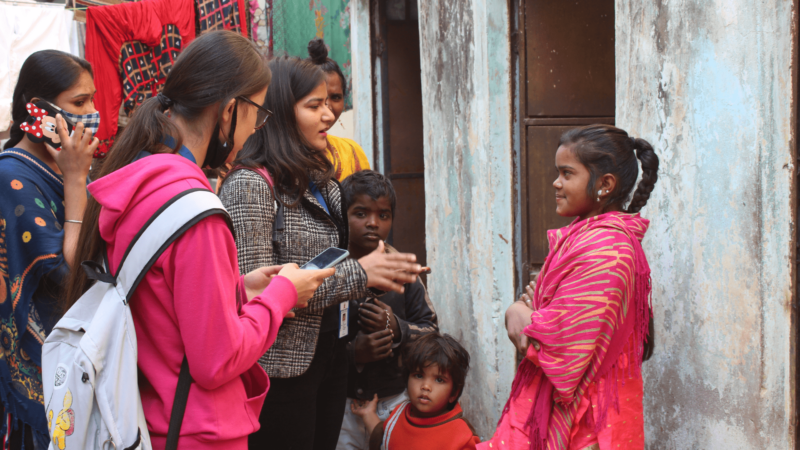To effectively adapt to and mitigate the impacts of climate change, those with lived experiences must be heard.
Despite this, little is done on a global level to empower those on the frontlines. Participatory Research in Asia (PRIA) works to change this.
Having been based in New Delhi since 1982 and with links to nearly 3,000 non-profit organisations, PRIA is a global centre for participatory research and training, focusing specifically on building capacity and knowledge and shaping functional policies.
A member of the recently launched Adaptation Research Alliance, PRIA promotes the idea of ‘participation as empowerment’ and advocates for the importance of community voices within governance and research.
We spoke to Rajesh Tandon and Nikita Rakhyani, president and youth trainer respectively, about why PRIA joined the ARA, what they hope to achieve through the partnership, and why we should be empowering communities in the fight against climate change.
Q: Why was PRIA founded and what does the organisation aim to achieve?
Tandon: “PRIA was founded with the perspective of participatory research and training. This is the methodology we deploy in India and around the world, training several thousands of young professionals. It implies that knowledge is produced by communities as much as academies, that knowledge is produced to improve the situation of communities, and that knowledge is produced in the process of collaborating to solve problems. PRIA’s work aims to empower excluded communities through capacity building, knowledge sharing and policy advocacy.”
Q: Why did PRIA join the ARA?
Tandon: “We saw this as an opportunity to join a platform which has similar perspectives on knowledge production, knowledge dissemination and knowledge utilisation. Climate issues, such as adaptation and mitigation, can only be improved through practical action at the community level and where knowledge can then inform policy.”
Rakhyani: “This notion of community-led knowledge is very important to us and we want to show how it can directly lead to to concrete policies and actions. In order to move forward on these issues, we should be listening to the lived experiences of communities at the frontlines of climate change and the ARA serves as a platform for us to do this.”
Q: What can the two bodies accomplish together?
Tandon: “What PRIA brings to the ARA is four decades of expertise in the methodology of participatory research, which combines communities and experts who work together to find meaningful solutions to practical challenges. This is the first time that experts are approaching the matter of adaptation in a collaborative way. While PRIA’s expertise is not necessarily vast and deep in adaptation, it is so in terms of the methodology of participatory research. My hope is that we will very soon have a spread of solutions that are community-led and sustainable.”
Q: How does PRIA’s work apply to climate adaptation?
Tandon: “Our focus over the last decade has been on urban informal settlements. With growing urbanisation, the pandemic, and a huge migration happening in many countries, the lives and livelihoods of urban populations have severely been impacted by climate distress. We take the knowledge we collect from people affected directly to policymakers and municipal officials. We work with our network, made of community leaders and young students or professionals, to train them in how to use our methodology in their specific local context in order to respond to their unique situations.”
Rakhyani : “We have been working extensively with young people since 2017, trying to create a space for them to discuss the issues that matter the most to them. Over time, we realised that climate change has become a central point. We started engaging with them extensively, through our fellowship programme for example, to document their experiences.”
Q: Why is community knowledge, over expert-driven research, important?
Tandon: “The expert-driven model of development does not allow us to consider communities as knowledgeable, and this has been true in all fields. Of course, there is a role for experts, but we can’t be dismissive of communities’ own experiences and responsibilities. That’s also why a lot of funding goes primarily top-down to academic research. It is equally relevant to support communities in dealing with climate change. Communities need to find a reason to lead action, otherwise they will only be a submissive, passive recipient of solutions and the solutions won’t stick.”
Q: How can researchers empower communities to share on their knowledge?
Tandon: “Adaptation is happening in communities. But what we don’t always see happening is professional experts working with these communities. What we need is a more sustainable approach to adaptation. When researchers work with the communities, they can bring their research framework to the level of communities’ everyday problems and then undertake a joint research approach where communities feel included. Communities can then ‘own’ the findings, which will lead to them to acting on the knowledge and engaging with local authorities.”
This post was sponsored by Adaptation Research Alliance. See our editorial guidelines for what this means.
